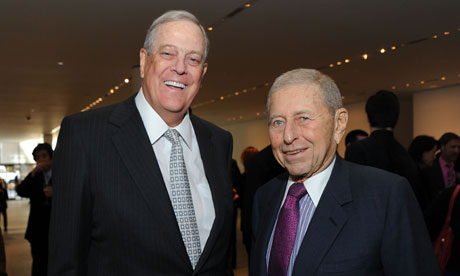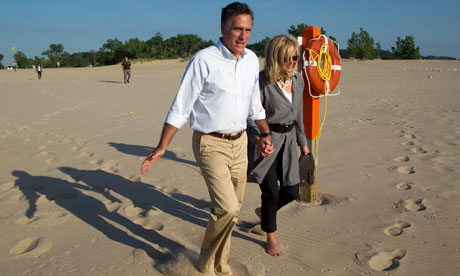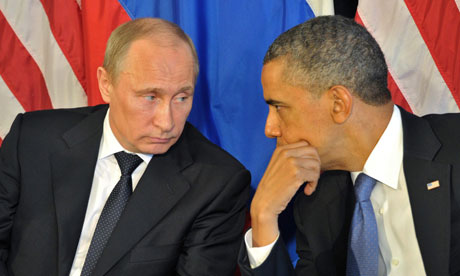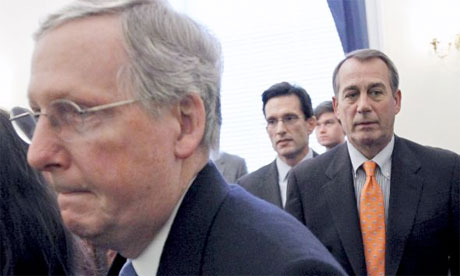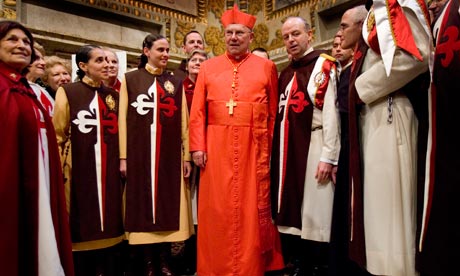The voice was hoarse, but that was the only sign that
Mitt Romney
was nearing the end of a gruelling tour through the battleground states
that will decide who wins the White House. Wearing jeans and with
sleeves rolled up, the Republican presidential hopeful bounded on stage
in Davenport,
Iowa, and launched a furious tirade on the only issue that matters: the ailing American economy.
He
warned the 1,000-strong crowd – who had gathered in a park in the heart
of this town on the Mississippi river – that Obama had failed to bring
about a recovery. Sounding like a leftist populist, he bemoaned low-wage
jobs, the collapsing wealth of the middle class and home foreclosures.
He pinned the blame on Obama. "His record is not something that he can
talk about. In his last campaign he had 'hope and change'. Now they are
hoping to change the subject," he said.
Could Romney, a wealthy
financier who has repeatedly defended big business and extolled the
virtues of the free market, really become the beneficiary of a crisis of
capitalism? He seems an unlikely champion of the "little guy". But in
the furious cut-and-thrust of the 2012 election that does not matter.
Prospects
for an Obama win have been buffeted by poor job figures and the threat
of economic meltdown in Europe. Romney's team know that convincing
America's swing voters that they might have better job prospects under
Republican rule could turn the former Massachusetts governor into a
president. The 2012 election is now up for grabs.
Arriving in Iowa
on his "Every Town Counts" bus tour, Romney had already travelled
through New Hampshire, Wisconsin, Ohio and Pennsylvania. Just like Iowa,
all are states Obama won in 2008 and that Romney is now hoping to win.
In order to do so he appears to have jettisoned the social conservatism
that marked his nomination race.
Instead, Romney tried an "I feel your pain" tactic of sympathising with economic hard times.
Farmer
Linda Swiezcinsky, who cheerfully admitted to being a Michele Bachmann
fan during the Republican party's bitter primary race, now wore a red
T-shirt emblazoned with a giant portrait of Romney. "It is neck and neck
at the moment but I think Romney will win," she said.
While
Romney becomes more sure-footed, the Obama campaign lacks momentum.
Despite recent policy shifts on issues including gay marriage and
immigration, Obama's Democratic base remains much less enthusiastic than
2008. After he promised a "recovery summer" in 2010, America has
remained economically sickly. Domestically, Obama's biggest legislative
achievement has been healthcare reform. But the new law – under
withering Republican fire – has become less popular and the supreme
court
could even strike it down as unconstitutional.
Obama's image as a likeable, liberal leader has also been eroded by rumours of aloofness and a ruthless expansion of
hardline national security tactics from
the George W Bush era, exemplified by the deployment of increasingly
controversial drone strikes overseas. Recently three top Democratic
strategists, including Bill Clinton's campaign guru, James Carville,
drew up a memo warning that Obama might face an "impossible headwind" in
the election.
The memo, based on focus groups from Ohio and
Pennsylvania, found voters disliked Obama's message that the economy was
slowly improving. "These voters are not convinced that we are headed in
the right direction," the memo warned. Other experts agree that Obama's
current plan of assuring American voters that things would have been
worse without him – even if true – is not a winning strategy. "It is a
challenge. Americans tend to be more: what have you done for me lately?"
said Professor David Cohen, a political scientist at the University of
Akron in Ohio.
Jim Giese, who runs an Iowa roofing business, is
certainly no fan of Obama. As Romney toured Iowa, Giese grabbed a place
on a Mississippi boat trip the candidate was taking from Dubuque. As he
walked to meet Romney on the old-fashioned paddle steamer berthed on
Dubuque's waterfront he slammed Obama's handling of the economy.
"It
is just trending in the wrong direction. Our margins are down and we
have had to lay people off. The guy is a disaster," he said.
The
mood among Romney advisers is buoyant and jibes at Obama are everywhere.
"Before he was president he never managed anything bigger than his own
narrative and now he's having a hard time managing this economy," said
senior Romney adviser Russ Schriefer. In Davenport, Romney's Iowa
campaign chairman, Brian Kennedy, pumped out the same relentless
message. "For three-and-a-half years he has failed… that is our message.
Let's take it to our friends and neighbours and church members and
colleagues," he told the Davenport crowd.
The Romney campaign is
rapidly earning a reputation for efficiency and a secretive style that
maximises control of the message. His schedule is often released only a
day or two before events and every effort is made to minimise unscripted
interaction with the press. Reporters are shooed away from the "rope
line" where candidates mingle with the public.
Romney himself is a
private person who still often appears wooden in public, certainly when
compared to Obama. But he has also showed himself – and his campaign –
to be ruthless and hard-edged. In dealing with an unexpectedly raucous
nomination fight, Romney's team showed it could play dirty and spend big
when destroying rivals including former House speaker Newt Gingrich,
Texas governor Rick Perry and former Pennsylvania senator Rick Santorum.
Though Romney's own efforts
were often marred by gaffes, especially linked to his wealthy lifestyle, those mistakes have decreased markedly in recent weeks.
Of
course, not everyone is convinced. National polls average out to have
Obama with a narrow lead of a couple of percentage points, though an
incumbent president
would usually be expected to be performing more strongly at
this point. In the small Iowa town of Solon, an hour or so's drive from
Davenport, retired electrician Kent Connelly said he was not falling
for Romney's schtick. "He does not come across as someone who cares that
much. I see him as someone who will say anything to get elected,"
Connelly said.
And Solon definitely counts as somewhere suffering
from hard times. Though Iowa's overall jobless rate is below the 8%
national average, Solon's is a whopping 14.3%.
Freed up by
a supreme court ruling,
Republican-supporting groups are preparing to pump hundreds of millions
of dollars into the race. Last week alone three different TV ads began
airing in swing states, all swiping at Obama over the economy. Some
experts think Romney and his supporters could spend at least $1.25bn on
TV ads.
"I can see a president getting bought into office," Connelly said.
If Romney generates enough support to grab the Oval Office, the swell of votes would certainly see
Republicans
retain control of the House of Representatives and might even see them
grab the Senate. Then Romney would likely get at least one opportunity
to appoint a supreme court judge in his first term, probably replacing
one liberal justice. That would skew the court even more conservatively
for a generation.
Romney thus could actually find himself in a
position of immense Republican power. No wonder then that in Davenport
he came on stage with such enthusiasm. "This is the wind of change, you
know that?" he beamed.
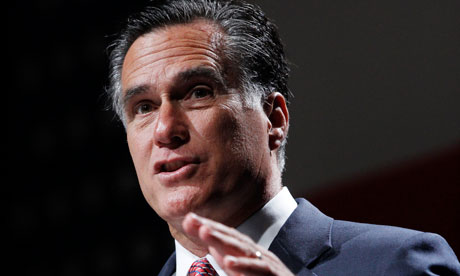

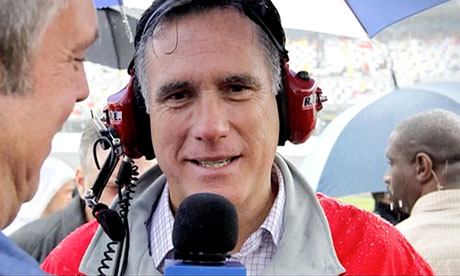
 The ruling ahead of the US Supreme Court may be one of the most significant constitutional rulings of the century. Photo: Reuters
The ruling ahead of the US Supreme Court may be one of the most significant constitutional rulings of the century. Photo: Reuters